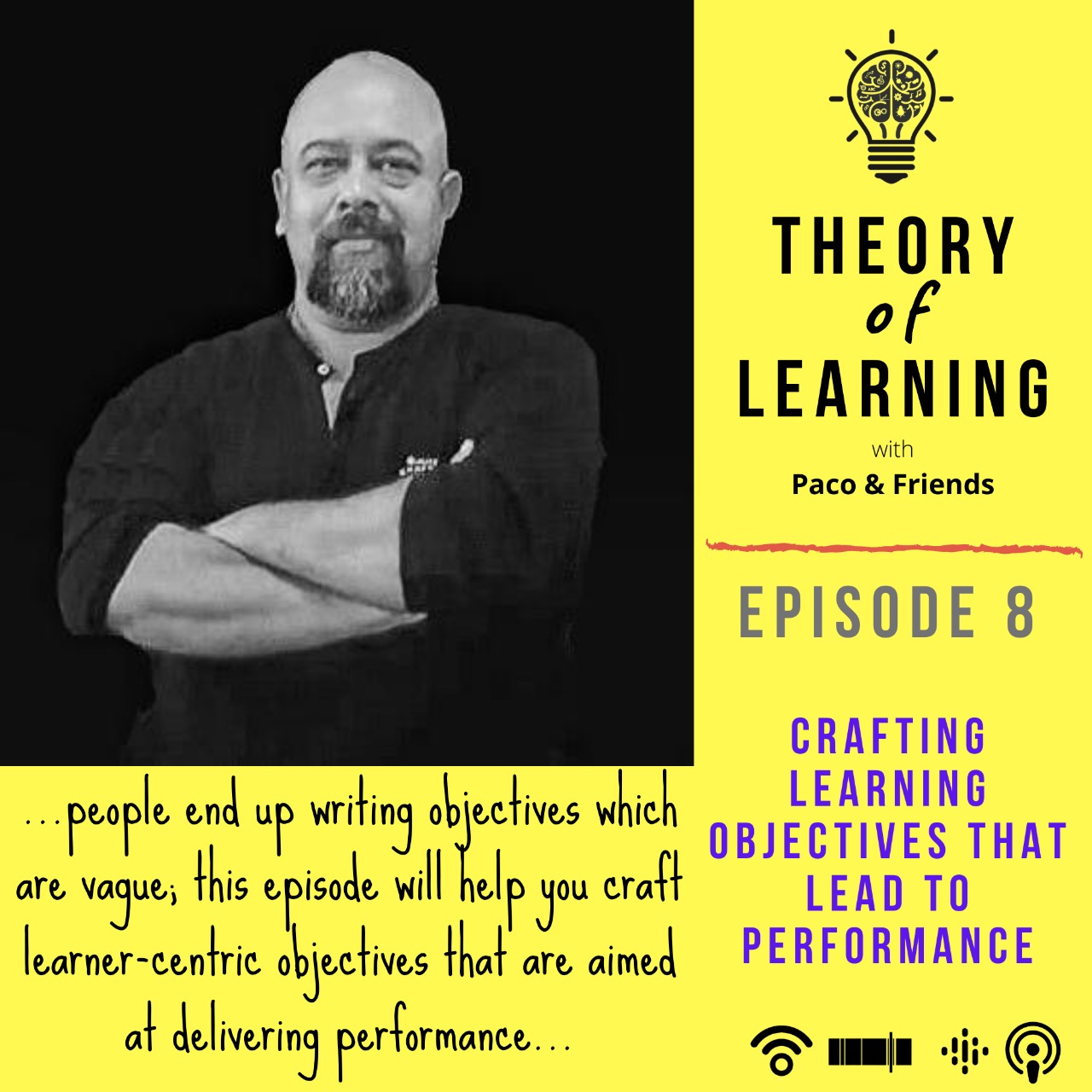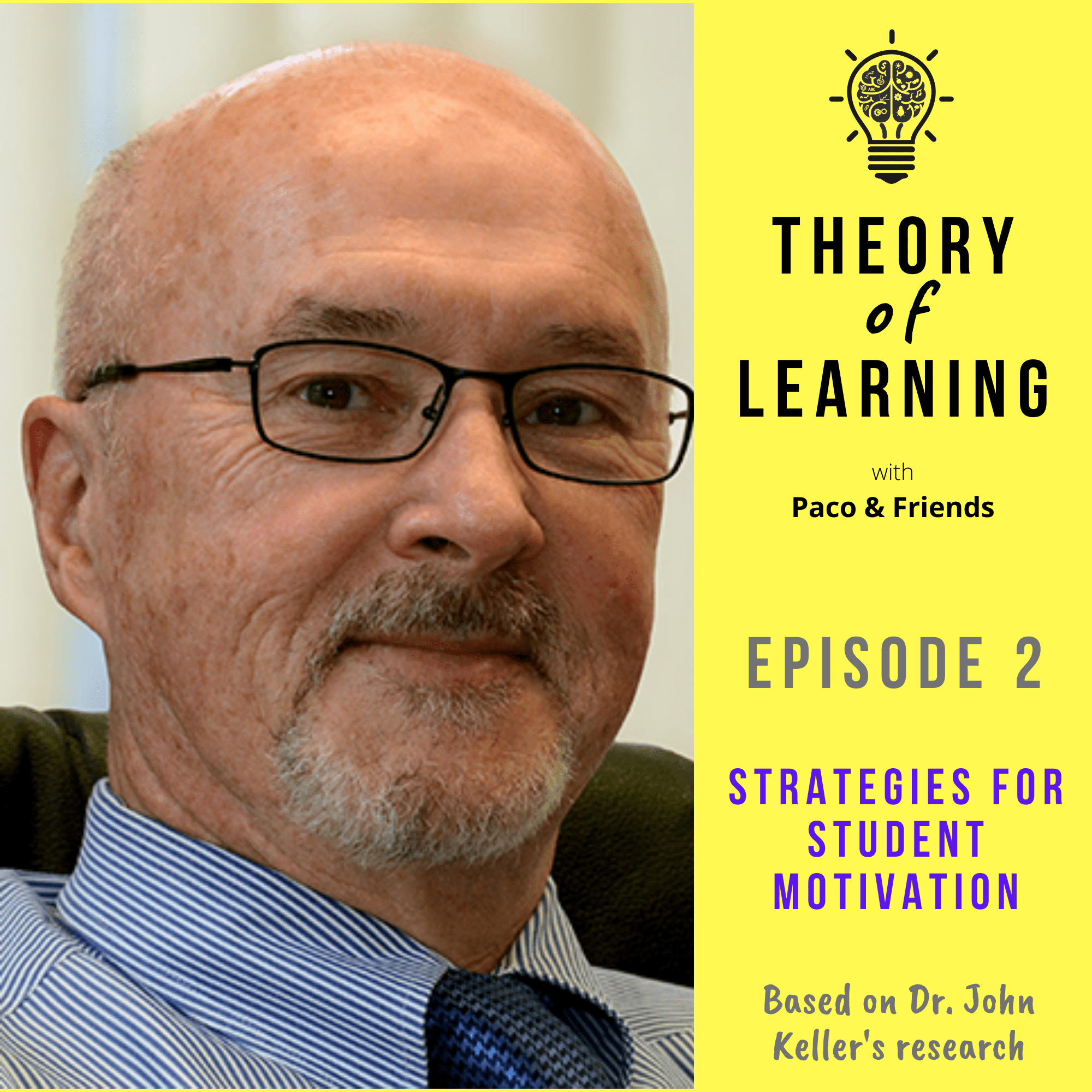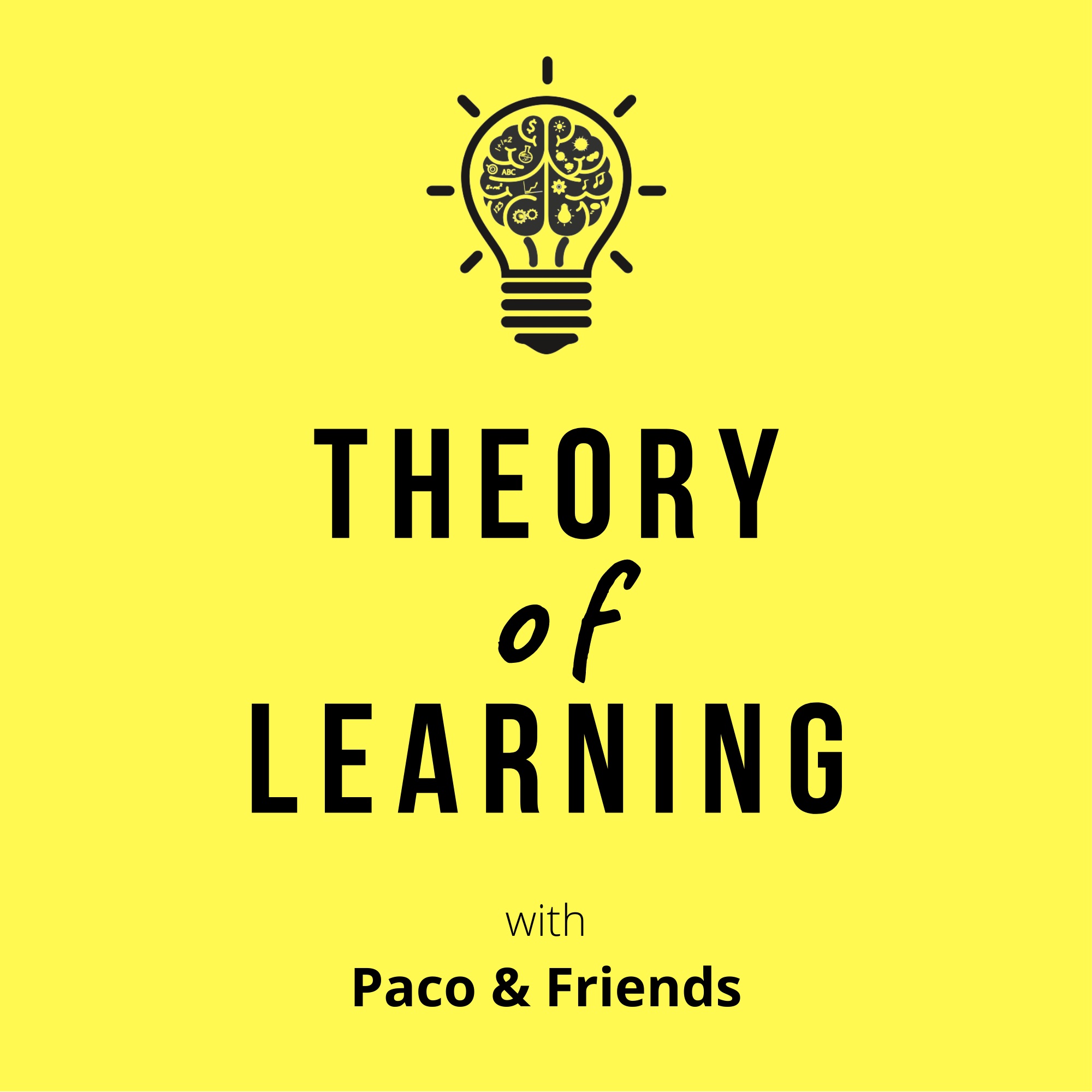Discover Theory of Learning
Theory of Learning

Theory of Learning
Author: Paco and Friends
Subscribed: 41Played: 400Subscribe
Share
© Copyright 2020 All rights reserved.
Description
If you have anything to do with teaching, this is the place to be!
Theory of Learning is a show about helping you become a superior facilitator. And we do this by introducing you to digestible nuggets on various concepts at play in a learning environment.
We will not only dive deep into various concepts of learner-psychology, but also provide a context of how they work in a various teaching environments.
Subscribe to the show for helpful insights that can help you become a superlative facilitator. And if you have recently taken up the profession then this show will help you catapult your understanding of learners quickly.
We will also cover other superior facilitators as they describe their journey and what made them awesomely liked by their learners.
Theory of Learning is a show about helping you become a superior facilitator. And we do this by introducing you to digestible nuggets on various concepts at play in a learning environment.
We will not only dive deep into various concepts of learner-psychology, but also provide a context of how they work in a various teaching environments.
Subscribe to the show for helpful insights that can help you become a superlative facilitator. And if you have recently taken up the profession then this show will help you catapult your understanding of learners quickly.
We will also cover other superior facilitators as they describe their journey and what made them awesomely liked by their learners.
10 Episodes
Reverse
Our job is to engage students in a manner that while the student internalizes the content, one’s self-efficacy gets built towards the outcomes. And the best way to do it is to build content that appeals to the learner.
A learning style is a student's consistent way of responding to and using stimuli in the context of learning by appealing to the learner’s learning style.
Learning styles are points along a scale that help us to discover the different forms of mental representations; however, they are not good characterizations of what people are or are not like.
This episode talks about learning styles and how should not pigeonhole people as we are all capable of learning under almost any style, no matter what our preference is.
What are Learning Styles? [2:15]
What is auditory learning style? [5:25]
What is visual learning style? [6:40]
What is the reading/writing learning style? [9:40]
What is the kinaesthetic learning style? [10:45]
Learning Styles and Learning Preferences… and Multimodal Learners [14:35]
Kolb’s learning styles in the background of experiential learning [18:55]
Conclusion [23:00]
Key Takeaways [24:50]
Like, Subscribe and Follow the podcast on #ApplePodcast, #Spotify, #Podbean, or wherever you listen to podcasts.
Stay Hungry, Stay Foolish! Stay Tuned for More!
One of the top attributes required for superior facilitation, is the ability to craft learning objectives… or as I would prefer to call them… performance objectives. I believe that if the objectives of the training session are not geared to help you perform, then it is no relevance. More often than not, I either find facilitators not setting objectives or setting the wrong objectives, or setting the objectives just for the heck of it. Now, each of these scenarios is dangerous and so in this episode, I will help you craft learner-centric objectives that are aimed at delivering performance.
If you wish to include these in your life as an educator, then you are at the right place. Listen to the podcast.
> Conscious Competence Matrix of the Stages of Learning [4:10]
> What if we do not set learning objectives? [8:16]
> What are the components of crafting a learning objective [10:15]
> What are the issues that need to be kept in mind while crafting objectives [19:03]
> How is it that some objectives are considered poorer than others [25:11]
> What are some examples of poorly structured objectives? [27:03]
> How to ensure that the objectives are crafted properly? [29:27]
> What are the right set of words that should be incorporated in learning objective statement [30:10]
> Take-aways [34:55]
Like, Subscribe and Follow the podcast on #ApplePodcast, #Spotify, #Podbean, or wherever you listen to podcasts.
Stay Hungry, Stay Foolish! Stay Tuned for More!
Different types of learning exist and different instructional conditions can bring about this learning…
The aim of any instructional designer is to not only make content relatable for the learners, but also make it enjoyable for the learner to feel inspired. Robert Gagne’s model provides a systematic process that helps educators and instructional designers develop strategies and create activities for training sessions.
There are many ways to present and reorganize the training material to make it meaningful and relevant to learners. This podcast aims to bring forward not just the theory, but also provides you with examples of how you can make your course content shine and engage your learners.
Let us dive a little deeper to see what this is all about, why is it important, what are the factors contributing to it, and, what can we, as facilitators, do to ensure that we build the right learning design.
This episode answers some key questions…
Who was Robert Gagne? [3:26]
What are the Conditions of Learning? [7:12]
What are the 5 categories of Learning-Outcomes? [9:32]
How to enhance learning in each of the categories. [12:47]
Explanation of the 9 Events of Instructions along with steps to plan instructions. [16:32]
Conclusion [41:09]
Key Take-Aways [45:11]
If you wish to include these in your life as an educator, then you are at the right place. Listen to the podcast. Subscribe, follow and leave your comments to help me improve.
Write to me at theoryoflearning@outlook.com to claim your takeaway from this episode… do not forget to give me a list of what you want me to cover in future episodes.
The ADDIE analysis phase serves a major role in the quality assurance process. It defines the project’s needs and ways to measure its success. If you skip ADDIE’s analysis phase, you can easily introduce mistaken assumptions into the project such as wrong focus that could lead the course to be boring and frustrating for the learners and to top it all you could end up with incomplete, redundant, or inaccurate content.
If you rush to development, you may not catch those errors until you launch the course. At that point, it can be very costly to fix or redesign the course. In essence, the training needs analysis is time well-spent.
Unsurprisingly, the better you study the requirements prior to the course creation, the more effective the resulting course will be. Analysis helps you gain a clear understanding of the primary target audience, learning goals, physical and organisational constraints, technical requirements and structural characteristics of the course, and criteria used for assessment.
Let us dive a little deeper to see what this is all about, why is it important, what are the factors contributing to it, and, what can we, as facilitators, do to ensure that we build the right learning design.
If you wish to include these in your life as an educator, then you are at the right place. Listen to the podcast.
Subscribe, follow and leave your comments to help me improve.
Write to me at theoryoflearning@outlook.com to claim your takeaway from this episode… do not forget to give me a list of what you want me to cover in future episodes.
Episode 05: Forgetting Curve!
Research says that people start forgetting within one hour of their training being completed. The research continues to state that this percentage dramatically increase with lapse of time. Personally speaking, the percentages and the spread across days may be questionable, but the figures are high for sure. A dirty secret of corporate training is that no matter how much you invest into training and development, nearly everything you teach to your employees will be forgotten. Indeed, although corporations spend billions of dollars every year on training, this investment is like pumping gas into a car that has a hole in the tank. All of your hard work simply drains away. But does that mean that we stop training, or are there ways to improve upon the situation.
Let us dive a little deeper to see what this is all about, why does this happen, what are the factors contributing to it, and, what can we, as facilitators, do to arrest the atrophy of knowledge & skills learnt.
If you wish to include these in your life as an educator, then you are at the right place. Listen to the podcast.
This episode answers some key questions…
What is memory? [9:05]
Why do we forget? [10:30]
Trace Decay Theory [11:42]
Displacement Theory [16:01]
Interference Theory [17:31]
Retrieval Failure Theory [22:18]
Hermann Ebbinghaus’ Forgetting Curve [25:56]
What are the factors that affect the rate of forgetting? [28:11]
How to increase the strength of your memory? [30:18]
How do we reduce the effect of the forgetting curve on our learners? [34:16]
What are the key take-aways? [40:04]
Subscribe, follow and leave your comments to help me improve.
Write to me at theoryoflearning@outlook.com to claim your takeaway from this episode… do not forget to give me a list of what you want me to cover in future episodes.
I like to think of it as a mindset that focuses on how to look at challenges around us. A mindset that can help us adapt to the process of being more mindful, and open to the right direction towards innovation. But while we do that, we must also know that it is no magic bullet. Methodologies and processes are important, but these are mere tools. What one needs to do is to get the right mindset to make that difference, and to really find the right direction towards the right solution.
Its about being curious. It’s the ability to observe. Its about understanding and empathising with the people you are designing for. Its not about optimizing, but about challenging to innovate. Its about being Systemic, yet be systematic about it.
If you wish to include these in your life as an educator, then you are at the right place. Listen to the podcast.
This episode answers some key questions…
What is the difference between Convergent and Divergent Thinking? [4:19]
What is Design Thinking? [5:43]
What is Empathise? [10:41]
What are the methods involved in ‘Empathise’? [12:43]
What is Define? [16:29]
What are the methods involved in ‘Define’? [18:10]
What is Ideate? [26:08]
What is Prototyping? [28:29]
What is Test? [31:27]
If I were to get the overall understanding in around two minutes… [34:59]
What are the key take-aways? [37:17]
Subscribe, follow and leave your comments to help me improve.
Write to me at theoryoflearning@outlook.com to claim your takeaway from this episode… do not forget to give me a list of what you want me to cover in future episodes.
Does learning lead to people behaving differently? If not, then how do behaviours get formed? And if that is the case how do wrong behaviours get built? If we know how it gets built, then can behaviours be modified? In adult learning environment at workplace, how do we ensure that behaviours get modelled? And what about virtual-learning sessions… does the theory hold ground there!
If these questions have bothered you and you never seem to get a hang of it, then you are at the right place. Listen to the podcast.
This episode answers some key questions…
What should one understand from Social Learning Theory? [4:14]
What is the difference between Classical and Operant conditioning? [6:25]
What is Vicarious Reinforcement? [10:31]
What was the Bobo Doll experiment all about? [11:19]
Can you briefly explain the experiment and its outcomes? [18:11]
Can Social Learning Theory explain reactive aggression? [19:48]
What is de-individuation? [20:12]
What are the four steps for an observable behaviour to be learnt? [21:50]
What are the 3 central concepts of Social Learning Theory? [24:22]
How can the theory be applied in education? [24:44]
How can the theory be applied, specifically, in a virtual-learning environment? [29:00]
Donald Scott – A case study in social-work practice [34:56]
What are the key take-aways? [40:20]
Subscribe, follow and leave your comments to help me improve.
Write to me at theoryoflearning@outlook.com to claim your takeaway from this episode… do not forget to give me a list of what you want me to cover in future episodes.
This is Episode #2... this episode dives into Dr. John Keller’s ARCS model of Learner-Motivation!
This episode answers some key questions regards performance…
Why is learner-engagement important?
What are the four key elements that go in towards motivating your learners?
How to get the attention of our learners? (4:44)
How to build relevance of the learning for our learners? (9:12)
How to help build your learners’ confidence? (13:01)
How to ensure that the learner is satisfied? (21:54)
Subscribe, follow and leave your comments to help me improve.
Write to me at theoryoflearning@outlook.com to claim your takeaway from this episode… do not forget to give me a list of what you want me to cover in future episodes.
This episode dives into elements of Performance Improvement, inspired by Dr. Robert Mager's book, 'What Every Manager Should Know About Training'This episode answers some key questions regards performance…1. What is the importance of going past symptoms to look at performance related problems when ascertaining the need for intervention?2. What are the key elements that go in towards improving the performance of an individual?3. What is the right solution framework that will help your clients and consumers look at you as a consultant of performance improvement rather than just as a trainer?4. What is self-efficacy and how is it perhaps the most important thing that you do in the classroom?5. How training & coaching is inadequate to ensure improvement in performance?Subscribe, follow and leave your comments to help me improve.Write to me at theoryoflearning@outlook.com to claim your takeaway from this episode… do not forget to give me a list of what you want me to cover in future episodes.
Welcome to The Theory of Learning of Podcast. Theory of Learning is a show about helping you become a superior facilitator. And we do this by introducing you to digestible nuggets on various concepts at play in a learning environment.














Loved the examples
Honestly hats off to all of you. Sitting thousand miles away, listening to such wisdom is an honour. Thank you for a fantastic webinar. Stay Safe
it was a great experience to learn from it
That was a great session with you sir .
The opportunity to Learn From the Master itself "PACO". Thankyou for this podcast & now I can learn from you anywhere & everywhere. Regards.